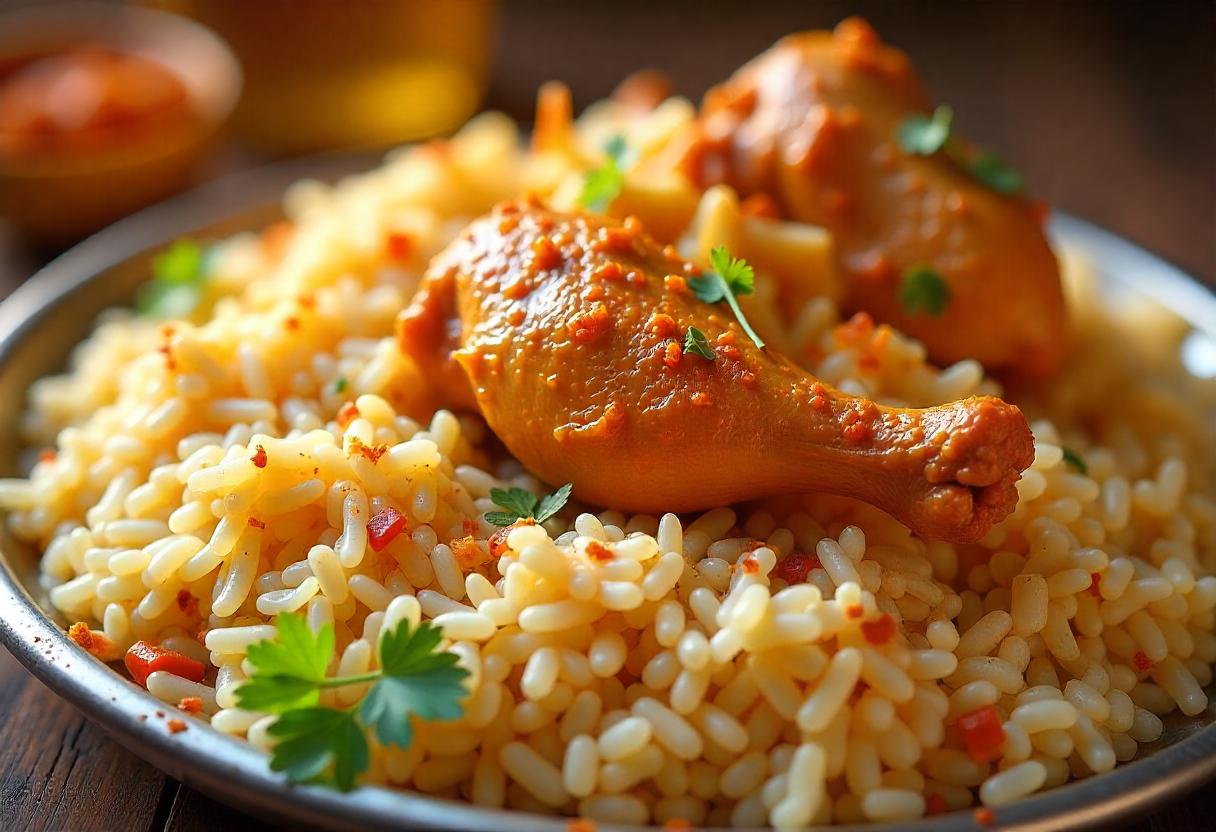How Long Does Chicken Biryani Take to Digest? Chicken biryani, a culinary masterpiece originating from South Asia, has gained global recognition for its intricate blend of spices, aromatic basmati rice, and tender chicken. While its rich flavors delight food enthusiasts worldwide, many are curious about How Long Does Chicken Biryani Take to Digest? and the factors influencing this process. In this in-depth article, we will explore the digestive journey of chicken biryani, analyzing the time each ingredient takes to break down, the role of spices, and how individual health factors play a part in the digestion of this beloved dish.
The Digestive Process: An Overview
Digestion is a complex process that begins the moment food enters the mouth and continues through the gastrointestinal (GI) tract. This system works to break down food into nutrients that the body can absorb and utilize. The digestion process can vary in duration depending on the type of food consumed and the individual’s digestive efficiency.
Key Stages of Digestion That How Long Does Chicken Biryani Take to Digest?
- Mouth: Chewing initiates mechanical breakdown, while saliva starts enzymatic digestion.
- Stomach: Gastric acids and enzymes break down proteins and fats.
- Small Intestine: Most nutrients are absorbed here with the aid of bile and pancreatic enzymes.
- Large Intestine: Undigested materials are processed, and water is absorbed.
Chicken biryani’s digestion time depends on its composition, which includes complex carbohydrates, proteins, fats, and spices. Each of these components follows a unique path through the digestive system, contributing to the overall time required for complete digestion.
What Influences the Digestion Time of Chicken Biryani?
Several factors affect how long chicken biryani takes to digest. These include:
- Meal Composition: The proportions of carbohydrates, proteins, and fats significantly impact digestion speed.
- Cooking Techniques: Preparation methods influence nutrient availability and digestion ease.
- Individual Metabolism: Factors like age, health, and physical activity levels determine how efficiently the digestive system works.
- Spices and Additives: Certain spices enhance digestion, while others might slow it down for sensitive individuals.
Nutritional Composition of Chicken Biryani
To understand the digestion time of chicken biryani, we must examine its key ingredients:
1. Rice
Biryani is typically made with basmati rice, a long-grain variety known for its aromatic quality. As a carbohydrate source, rice provides quick energy.
- White Rice: Digests faster than whole grains but lacks fiber, which slows digestion.
- Brown Rice (if used): Contains more fiber, prolonging digestion and providing sustained energy.
2. Chicken
Chicken serves as the primary protein source in biryani. Protein takes longer to digest compared to carbohydrates. Lean cuts of chicken are easier on the stomach, while fatty or heavily marinated pieces may delay digestion.
3. Spices
Biryani spices like cumin, cardamom, cloves, and turmeric are known for their digestive properties. However, their effects can vary:
- Turmeric: Promotes anti-inflammatory effects and aids digestion.
- Cumin: Boosts digestive enzyme secretion.
- Cardamom: Soothes the stomach and reduces bloating.
4. Fats
Ghee (clarified butter) or oil is often used to enhance the flavor and richness of biryani. Fats take the longest to digest and can significantly influence the total digestion time of the dish.
5. Vegetables and Accompaniments
Biryani may include vegetables like onions, tomatoes, and potatoes, which add fiber and nutrients. Accompaniments like raita, made from yogurt, contain probiotics that support digestion.
Breaking Down the Digestion Time
1. Carbohydrates (Rice)
Rice, especially white basmati, is a simple carbohydrate that digests quickly, typically within 1–2 hours. However, the inclusion of oils and spices can slow this process slightly.
2. Proteins (Chicken)
Proteins require more time to digest, averaging around 4–6 hours, depending on the preparation method. Tender, marinated chicken digests more efficiently than fried or overly seasoned chicken.
3. Fats (Ghee/Oil)
Fats can take 6–8 hours to break down fully in the stomach. The quantity of ghee or oil used in biryani directly impacts digestion time.
4. Fiber (Vegetables and Spices)
Vegetables and spices, if used in significant amounts, can aid or slow digestion. High-fiber content prolongs digestion but benefits gut health by promoting regularity.
Total Estimated Digestion Time
Given the combination of carbohydrates, proteins, fats, and spices, chicken biryani typically takes 6–8 hours to digest fully. This time can vary based on portion size, individual metabolism, and accompanying beverages or side dishes.
Factors Affecting Chicken Biryani Digestion

1. Portion Size
Large portions require more digestive enzymes and gastric juices, extending digestion time. Eating smaller portions can ease the digestive process.
2. Cooking Method
Healthier cooking methods, like steaming or pressure cooking, preserve nutrients and aid digestion. Deep-fried or excessively oily biryanis take longer to digest due to the increased fat content.
3. Individual Metabolism
Factors like age, fitness level, and medical conditions significantly influence how the body processes food. For instance:
- Younger individuals with faster metabolisms may digest biryani quicker.
- Older adults or those with slower metabolic rates may experience prolonged digestion.
4. Spices and Seasonings
While most spices in biryani aid digestion, heavy spicing or excessive chili can irritate the stomach, leading to indigestion in some individuals.
Tips to Improve Digestion of Chicken Biryani
1. Stay Active
Light physical activity, such as a 10–15 minute walk after a meal, can stimulate the digestive process and prevent bloating.
2. Drink Herbal Teas
Consuming warm ginger, peppermint, or fennel tea after eating biryani can soothe the stomach and enhance digestion.
3. Pair with Digestive Accompaniments
Yogurt-based raita or pickles contain probiotics and enzymes that improve gut health and facilitate digestion.
4. Practice Mindful Eating
Chewing thoroughly and eating slowly allows digestive enzymes to work efficiently, reducing the risk of overeating and indigestion.
5. Avoid Heavy Desserts
Skipping rich, sugary desserts after biryani can prevent additional digestive strain.
Common Digestive Challenges with Chicken Biryani
1. Bloating and Gas
Spices or oily preparations can cause bloating in sensitive individuals. Remedies include:
- Chewing fennel seeds after the meal.
- Drinking warm water with a pinch of asafoetida.
2. Acid Reflux
Acidic accompaniments or heavy spices may trigger reflux. Solutions include:
- Consuming cold yogurt or buttermilk.
- Avoiding lying down immediately after eating.
3. Indigestion
Overeating or consuming oily biryani can lead to discomfort. Remedies involve:
- Herbal teas like chamomile or mint.
- Digestive tablets or over-the-counter antacids.
How to Make Chicken Biryani More Digestible

1. Opt for Healthier Fats
Replace ghee with lighter oils like olive or avocado oil to reduce fat content.
2. Use Whole Spices
Whole spices enhance flavor and support digestion without overwhelming the stomach.
3. Incorporate Fiber
Adding vegetables like carrots, peas, or spinach increases fiber content, improving overall gut health.
4. Balance Protein and Carb Ratios
Maintaining a balanced ratio of chicken to rice ensures a steady digestive process without overloading the stomach.
Conclusion
Chicken biryani is a delightful dish with a rich nutritional profile and complex flavor. While its digestion time ranges from 6–8 hours, several factors, including portion size, preparation methods, and individual health, influence this duration. By adopting healthier cooking techniques, staying hydrated, and consuming digestive aids, you can enjoy this iconic dish without discomfort.
FAQs: How Long Does Chicken Biryani Take to Digest?
1. What is the average time chicken biryani takes to digest?
Chicken biryani typically takes 6–8 hours to digest fully. This time frame accounts for the breakdown of its key components: rice (carbohydrates), chicken (proteins), ghee or oil (fats), and spices.
2. Does the type of rice in biryani affect digestion time?
Yes, the type of rice impacts digestion time:
- White Basmati Rice: Digests faster due to its low fiber content, taking approximately 1–2 hours.
- Brown Rice (if used): Takes longer because of its higher fiber content, which slows digestion and provides sustained energy.
3. How does the preparation method influence digestion?
Cooking methods significantly affect digestion:
- Pressure-cooked or steamed biryani is easier to digest as it retains nutrients while minimizing oil and fat.
- Fried or heavily oiled biryani takes longer to digest due to higher fat content.
4. What role do spices in biryani play in digestion?
Spices in biryani can either aid or hinder digestion:
- Aid Digestion: Spices like cumin, turmeric, ginger, and cardamom promote enzyme secretion, reduce bloating, and improve gut health.
- Cause Discomfort: Excessive chili or heavily spiced biryanis may irritate the stomach and slow digestion for sensitive individuals.
5. Does portion size affect digestion time?
Yes, larger portions take longer to digest as they require more gastric juices and enzymes. Eating smaller portions helps the stomach process food more efficiently.
6. How does the fat content in biryani impact digestion?
Ghee or oil, commonly used in biryani, slows digestion because fats require more time to break down. Fatty meals can take up to 6–8 hours to fully digest.
7. Can individual metabolism change the digestion time of chicken biryani?

Yes, metabolism varies among individuals based on age, physical activity, and health conditions:
- Faster metabolism: Younger, active individuals may digest biryani quicker.
- Slower metabolism: Older adults or those with slower digestive systems may take longer.
8. Are there specific digestive issues linked to chicken biryani?
Some individuals may experience:
- Bloating: Due to high fat or spice content.
- Acid Reflux: Triggered by spicy or oily biryani.
- Indigestion: Often caused by overeating or consuming heavy accompaniments.
9. Does eating chicken biryani at night slow digestion?
Yes, eating biryani late at night can slow digestion, as the body’s metabolic rate is lower during sleep. It is best to consume heavy meals earlier in the day.
10. What beverages are ideal after eating chicken biryani to aid digestion?
- Warm water: Promotes digestion and prevents bloating.
- Herbal teas: Ginger, fennel, or peppermint tea can soothe the stomach and improve digestion.
- Probiotic drinks: Like lassi or buttermilk, enhance gut health.
11. How can I make chicken biryani easier to digest?
- Use less oil or ghee during preparation.
- Incorporate more vegetables for added fiber.
- Pair it with raita or yogurt to aid digestion.
- Avoid overeating and choose smaller portions.
12. Are there health benefits to the spices in chicken biryani?
Yes, spices in chicken biryani have several health benefits:
- Turmeric: Anti-inflammatory and supports digestion.
- Cumin: Stimulates enzyme secretion and reduces bloating.
- Cardamom: Relieves indigestion and enhances gut health.
13. Can children digest chicken biryani easily?
Children with healthy digestive systems can digest chicken biryani, especially if prepared with mild spices and minimal oil. Ensure smaller portions to avoid overburdening their digestive systems.
14. Why do some people feel bloated after eating chicken biryani?
Bloating can occur due to:
- Excessive oil or ghee.
- Overeating large portions.
- High spice content, which might irritate sensitive stomachs.
15. What should I do if I experience discomfort after eating chicken biryani?
- Drink a cup of warm ginger or peppermint tea.
- Chew on fennel or carom seeds.
- Take an over-the-counter antacid if discomfort persists.
16. How does pairing chicken biryani with yogurt or raita help digestion?
Yogurt and raita contain probiotics, which enhance gut health and support the digestive process. They also help cool the stomach, reducing the effects of spices.
17. Is chicken biryani suitable for people with sensitive stomachs?
People with sensitive stomachs can enjoy biryani if it is prepared with less oil, mild spices, and paired with digestion-friendly accompaniments like yogurt.
18. How does physical activity influence digestion after eating biryani?
Engaging in light physical activity, like a 10–15 minute walk, can stimulate digestion and prevent bloating or discomfort after consuming biryani.
19. Can drinking water during a biryani meal slow digestion?
Drinking excessive water during meals can dilute gastric acids, potentially slowing digestion. Sip small amounts if needed, and hydrate well after the meal.
20. What is the best way to reheat leftover chicken biryani to retain its digestibility?
Reheat biryani using methods that preserve moisture, such as steaming or microwaving with a splash of water. Avoid frying, as it may increase fat content and slow digestion.

Daniel, a seasoned author with 8 years of expertise in SEO, brings a delectable blend of culinary flair and digital finesse to the food niche on his website.



